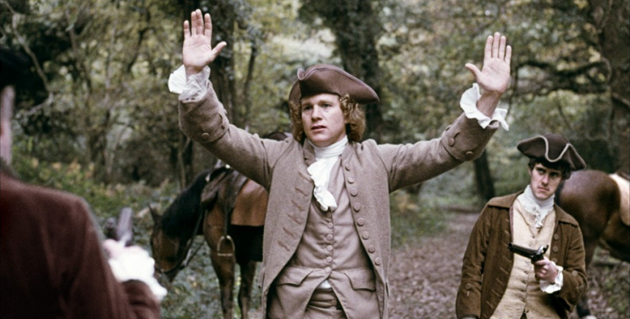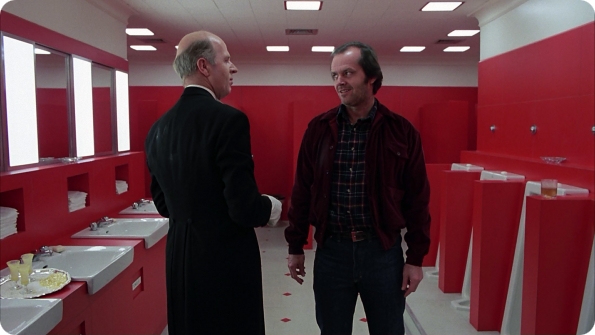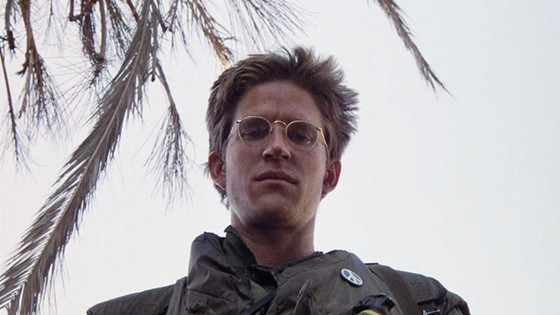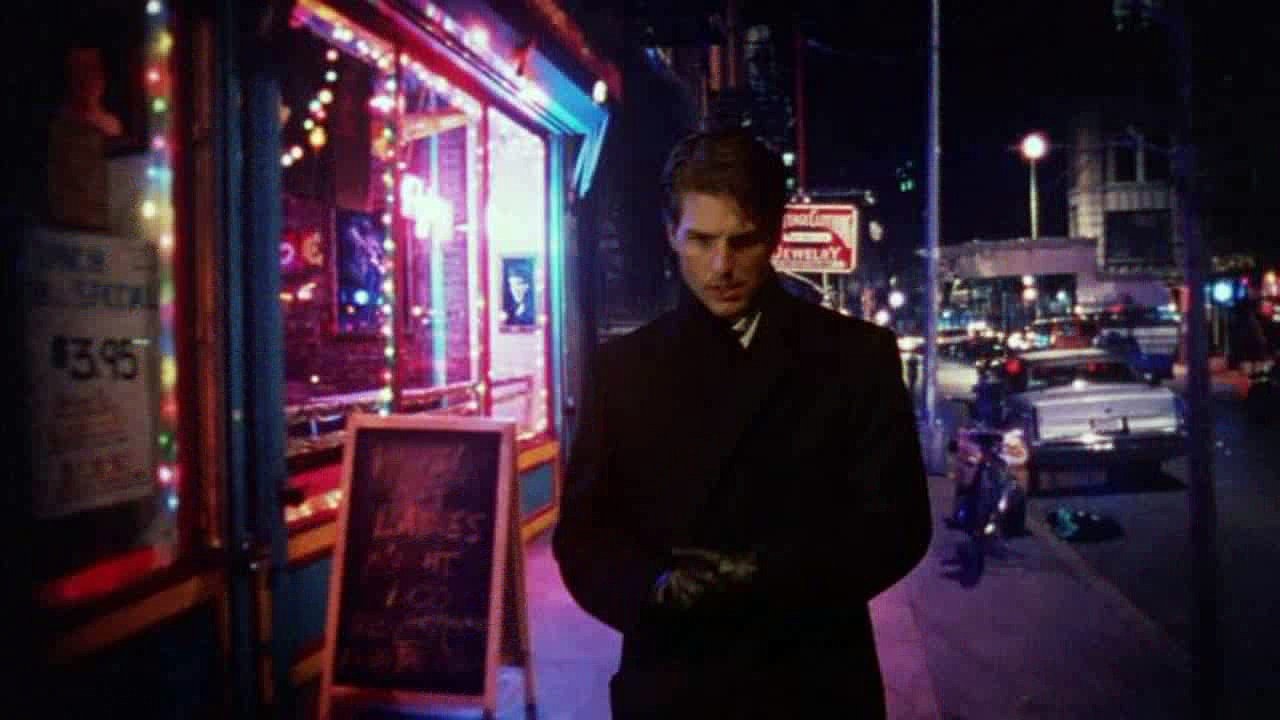4. Barry Lyndon

My personal favorite of the Kubrick legacy, Barry Lyndon follows Barry Lyndon (Ryan O’Neil), an Irish negligent who succeeds in marrying a wealthy widow and rising to the heights of the 18th century aristocratic class in England.
The film won 4 Oscars, a couple of big Golden Globes, and several other awards because, despite its length, the charm and nature of the film allows critics to enjoy a deep film concerned primarily with taking the rules of film and breaking them. This departure from film norms started perhaps with 2001, but in some ways it is clearest in Barry Lyndon, a film in which Kubrick purported to have had freedom to make the film how he liked.
A perfect example of this is the famed tale of the duel scene, which lasts 6 minutes and is an artistic masterpiece. The script, however, merely read “Barry duels with Lord Bullingdon.” It was made as Kubrick wanted it, without any outside influences. The film forces us to look past dialog and take into account the score, tone, pacing, lighting, and set to understand Kubrick’s point (if you think about it, 2001 marks this huge departure from the rest of American cinema) which is subtle at its finest points.
This stream-of-consciousness free-flowing style reflects that of Nabokov (the writer of Lolita, the basis for Kubrick’s earlier adaptation bearing the same name) and conveys Kubrick’s interest in going outside of language to convey meaning, which was an almost novel thing in American film at the time.
The message in Barry Lyndon seems to be that society is wretched, full of insane and destructive traditions, while mankind is a depraved, selfish creature that deserves the bad things which happen to it. So, yet again, Kubrick comments on the broken nature of mankind, mocking us and our feeble wills. If you think of the absurdity of the duels, greed, and relationships in the film, perhaps you’ll agree.
5. The Shining

Another interesting appropriation, The Shining is Kubrick’s use of the horror/thriller genre to make a few philosophical points. The film is also thought to have a hidden meaning (watch Room 237 to learn more of this) but most of these theories seem to be garbage.
It follows Jack Torrance (Jack Nicholson in one of my favorite performances), a writer fallen on hard times who brings his family to help him steward a resort during the winter months while he continues to work on his novel. An adaptation of the Stephen King novel, the film features several bizarre and inexplicable events which seem to be caused by the history of the resort and/or some peculiar characteristics of Jack’s son, Danny (Danny Lloyd).
The film seems to focus on three major philosophical themes: obsession, history, and a concept of retribution. Jack is clearly obsessed with his work and it becomes a convenient excuse for him to avoid his family and neglect his fatherly duties. In many ways, the events of the film are a result of Jack’s neglect and irresponsibility. Danny’s wanderings throughout the resort and different mishaps are certainly a byproduct of his boredom and lack of parental supervision.
Moreover, historical precedent and a sense of karma permeate the plot. We learn early on that a horrific murder happened at the resort by its last caretaker, and the film seems doomed to repeat these events regardless of how absurd that might seem. Perhaps more importantly though, we learn that the resort is built upon sacred Native American ground which was stolen (likely at the cost of many lives) to be reappropriated as a ski resort.
This irresponsible abuse is quite similar to what Jack is doing (pretending to watch the estate and to be with his family while really looking for ways to escape from both and write what is perhaps the most redundant novel of all time).
So in sum, obsession can ruin everything, history and its progression is always important to consider, and perhaps there is a greater cosmic sense of karma that works in conjunction with these two facts. If you haven’t seen a Kubrick film yet, I recommend you start with The Shining because, if nothing else, you’ll enjoy a classic Nicholson performance and witness perhaps the most artistic and well-executed film of the genre.
6. Full Metal Jacket

A return in some ways to our starting point of Dr. Strangelove, Full Metal Jacket is a jarring anti-war film following a platoon of Marines from their infancy in training to the front lines in Vietnam.
The film primarily follows Private. Joker (Matthew Modine), though perhaps its most touching and horrific incident is focused more on Pvt. Pyle (Vincent D’Onofrio), a marine who can’t take the abuse and torture of training at Paris Island. While I have no idea how realistic or unrealistic the hazing is that Pyle undergoes in this film, I have heard from many marines that basic is brutal and that Kubrick captures a part of what they go through.
The film’s main focus is the same throughout the training and wartime scenes: the serious dehumanization and near-brainwashing that has to take place to transform an ordinary citizen into a warrior capable of fighting against an ideology.
Kubrick captures the destruction and pain that the war causes in a unique way because his focus is not on the families of our fighting men and women but is rather on those men and women themselves. His message is tactful, because it does not question the bravery or loyalty of our soldiers (a thing which we should not do), but rather questions the motives of the Vietnam war and more importantly the justifications for it.
Is there any cause that is worth the brutality and ruthlessness we must subject our sons and daughters to for war? Kubrick’s answer is not a definitive no (understandably), but is rather a measured suggestion that we consider carefully all of the costs of going to war.
This prescience is astounding for a film made in 1987, because it helps to explain what causes the PTSD of our heroes today and begs its viewers to question their ethics. Moreover, Kubrick is yet again able to question the motives (tucked away in human nature) that prompt us to go to war, and to warn us of the damage that war can do to our souls.
7. Eyes Wide Shut

Kubrick’s last film, Eyes Wide Shut follows NYC doctor William Harford (Tom Cruise), a man who heretofore led a normal life. Dismayed after discovering that his wife Alice (Nicole Kidman) considered cheating on him, Harford decides to branch out of his marriage.
A friend of his tells him of a bizarre organization that holds parties full of beautiful young women, and Dr. Harford decides to make his way to one. However, the risks surely outweigh the benefits, and Dr. Harford soon finds himself in great danger with no good means of escape.
Full of incessant nudity, tension, and some drug use, the film is not an easy watch, though it does follow suit in Kubrick’s long line of provocative filmmaking (A Clockwork Orange, The Shining, and even Full Metal Jacket are perfect examples of Kubrick pushing the boundaries of the film rating system).
The film ultimately is about relationships: what drives them, limits them, defines them, and what can end them. This is fairly self-evident from the plot, as we see Dr. Harford attempt to cheat on his wife, discover that he cannot, decide how he feels about his wife, and even face events that threaten to end his relationship.
Moreover, the film is also about curiosity and humanity’s insatiable habit for something different and potentially better, which drives Dr. Harford to explore the bizarre and dangerous organization he attempts to infiltrate. This curiosity and yearning is tied inextricably to the stability of relationships for Kubrick, and is something that must be both carefully satiated and controlled for relationships to remain stable.
A balance between the two can lead to happiness and fulfillment, but knee-jerk reactions that cause imbalances can ruin relationships, happiness, and lives. Relationships are a continual topic in philosophy, from Plato onwards, but it’s hard to say from exactly where Kubrick has derived his philosophy. One can only say that there is a truth undergirding it that ought be heeded.
Author Bio: Ben Wilson graduated from Yale College in 2014 where he studied Philosophy and Political Science. He currently lives in Houston, TX, with his wife Rachel, where he works as a consultant while directing his first feature-length film. If you’re interested in discussing this piece or joining his film project, please contact him.